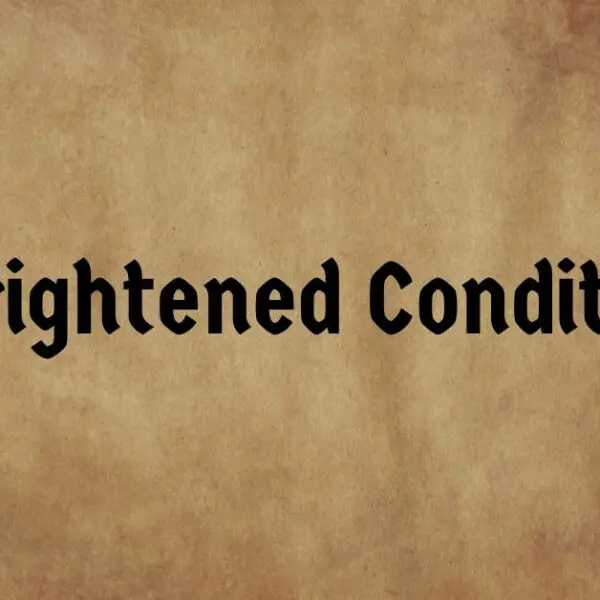Within Dungeons & Dragons 5e, there are some skills and abilities that different classes have that allow you to become the main target of your adversaries.
This can protect your most vulnerable teammates or divert attention away from Clerics and glass cannon spellcasters.
Fighters can use the tactic Goading Strike, whereas Paladins can use the spell mentioned in this Compelled Duel 5e guide.
Both of these skills are exclusive to their respective classes and are intended to allow both to protect their party members from the perils of the enemy.
Unlike Fighters, Paladins are more likely to have higher Wisdom and hence be more successful in their deeds.
Paladins of any oath can use their Bonus Action to protect their comrades (we hope) whether inside or outside of battle.
Is it, however, an ethical spell to cast if you’re a good-aligned paladin?
Compelled Duel Quick Summary
Compelled Duel is exclusively available to Paladins. It’s a first-level enchantment that may be cast as a Bonus Action. It can only be cast on a single creature within 30 feet of you.
Only the Verbal component is required for Compelled Duel. The creature being targeted must make a Wisdom saving against your Spell saving DC.
On a failed save, they are forced to battle you, putting them at a disadvantage when attacking others or limiting them to staying within 30 feet of you.
Most good-aligned Paladins will likely only use this spell in combat, although neutral and evil-aligned Paladins will use it anywhere and everywhere.
What is it Compelled Duel in 5e?

Compelled Duel is a level one enchantment. I have a range of 30 feet and can be cast as a Bonus Action. It just needs a verbal component, such a shouted statement or a taunt. This spell can last up to one minute if you keep your attention while casting it.
The creature you target must make a Wisdom saving throw when you cast Compelled Duel. On a failed save, they are forced to battle you by your demand.
It has a disadvantage when attacking someone or something other than you on each of its turns for the duration of the spell.
It must succeed on a Wisdom check against your Spell check DC each time it attempts to move into a space more than 30 feet distant from you.
If it fails the saving throw, your target’s movement is limited for the rest of their turn. If it succeeds, it will be able to move freely.
If you attack or target another creature, cast another spell on a different hostile creature, damage the creature you targeted, or end more than 30 feet away from your target, this spell will end.
This limits how Compelled Duel works in battle and how you may use it to its greatest potential – whether as a Dungeon Master or a Player.
Spell Attributes
- Spell List: Paladin
- 1st-level Enchantment
- Casting time: 1 bonus action
- Distance: 30 feet
- Components: V
- Duration: Concentration up to one minute
You try to force a creature into a duel. One creature within range that you can see must make a Wisdom saving throw. In the event of a failed save, the creature is attracted to you, compelled by your heavenly desire.
It has disadvantage on attack rolls against creatures other than you for the duration, and it must make a Wisdom saving throw each time it attempts to move to a space more than 30 feet away from you; if it succeeds on this saving throw, this spell does not restrict the target’s movement for that turn.
If you attack another creature, cast a spell that targets a hostile creature other than the target, damage or perform a detrimental spell on the target, or end your turn more than 30 feet away from the target, the spell ends. (Source The Player’s Handbook)
Some people dispute on the specifics of the Compelled Duel spell. If a target wishes to move more than 30 feet away from the caster, they must complete a Wisdom saving throw.
This is significant because the spell will be terminated if the target is more than 30 feet from the caster at the end of the caster’s turn.
The majority of DMs interpret the spell so that failing the saving throw prevents the target creature from advancing more than 30 feet.
Some claim that the rules do not state this, and therefore failing the Wisdom saving throw does not preclude the creature from moving at all.
It is crucial to note that the D&D rules are open to interpretation. Both players and DMs are free to modify the rules to fit their preferred playing style.
Who Can Use Compelled Duel?
Unfortunately for any overzealous Fighters or Barbarians, Paladins are the only class with access to this first-level spell.
Unfortunately, Feats such as Magic Initiate and Spell Sniper do not grant you access to Paladin spells.
However, for Fighters, Barbarians, or anyone who believes they must have this spell in their life, you can acquire quick access to it by leveling up to Paladin.
There is a prevalent myth about Paladins that you must be tied to a god of some type to gain power – this is just not true.
Although Paladins are typically tied to a deity by their oath, they obtain their magic from their oath rather than from their deity.
So, if your fighter is on a revenge kick to avenge the death of a family member, you can take an Oath of revenge and acquire a Paladin level without the middle ground of a deity.
Only two classes in Dungeons and Dragons 5e require a deity or some powerful creature to fuel their magical abilities: Clerics and Warlocks.
So, if you don’t want to get too involved with the deities in your game for any reason, Paladin should be very easy to achieve.
How to Use Compelled Duel as a Bonus Action?
As a general rule, unless explicitly indicated in the spell description, most spell casters cannot cast as a Bonus Action. Fortunately, in the fifth edition of Dungeons and Dragons, this one can be cast as Compelled Duel.
This means you can take your normal actions and then, at the end of your turn (or before your actions if you want), cast Compelled Duel to complete your turn.
This move is great regardless of where you are in the initiative sequence because your opponent will be at a disadvantage when attempting to strike at your opponents and will have a tough time fleeing away.
Another thing to keep in mind is that, as stated formally, Bonus Actions cannot be used as Actions. In response to a Twitter question in 2018, Jeremy Crawford, Wizards of the Coast’s lead rules designer, emphasized that Actions and Bonus Actions are not interchangeable.
However, I have yet to strictly adhere to the guidelines, and I do not believe you should either. Being a Rules Lawyer and demanding that the table dot every ‘i’ and cross every ‘t’ can take some of the fun out of the game, especially as homebrew grows in popularity.
If it works better for your table to prevent Bonus Actions from becoming Actions, that’s great, but I see no harm in it, especially because there are so few spells available as Bonus Actions.
Taking an Action as a Bonus Action, on the other hand, is a completely other ballgame, given that Bonus Actions are often less intensive tactics than Actions.
To be sure, wanting to use Bonus Actions for a Paladin build will be uncommon, but not impossible.
Compelled Duel Ethics

The most frequent kind of Paladin is the lawful good, or ‘good’ aligned Paladin. This, in turn, raises the question of the ethics of using Compelled Duel, both inside and outside of combat.
Most people will not have an issue with this because the nitty-gritty of ethics and the reality of using enchantment spells to compel someone to do something they would not do otherwise are not part of their games.
This section is vital if you strongly rely on the alignment system while playing and your game enjoys delving into the ethics of specific actions.
Good Alignment
Let us begin by assuming that the majority of Paladins are of the ‘good’ alignment. A good alignment is often regarded as someone who is giving, philanthropic, and generally searches for methods to help build a healthy environment.
Good aligned characters frequently contribute without expecting anything in return. When combined with the Paladin, you have your typical “Moral and Honorable” character.
This raises the question of whether Compelled Duel is a moral spell. This spell, by definition, persuade someone to do something that may or may not be against their will. The morals of this spell will be strongly influenced by the situation.
If you can persuade an adversary to duel you and focus on you instead of your friends, I believe you and your Paladin have made an ethical and moral decision.
The opponent was already fighting you against their will; all you’re doing is convincing them to concentrate on you.
However, pressuring someone to fight you when they would not, such as a shopkeeper who may have rejected you and your party, is not an ethical decision.
Already planning a duel for honor? Ethical. Making the peasant who ran into you fight you one-on-one? Unethical.
These and preceding examples clearly indicate that the ethicality of Compelled Duel for a good-aligned character is highly dependent on the intentions of the opposing side.
Neutral and Evil Alignment
If you’re playing a neutrally aligned character, as is most usual, you should be alright using this spell as long as it benefits you and doesn’t cause undue harm to the greater good.
Consider, on the other hand, that you are not playing an honorable Paladin, but rather an evil Paladin.
In this instance, you’ll have a lot more fun using Compelled Duel, especially against someone you know you’ll beat in a battle.
When you’re playing a wicked Paladin, you can cast this spell with little concern for the other party’s intentions.
This makes wicked Paladins one of the most liberating classes to play, but it also makes it incredibly easy to be a rude player.
Most parties don’t include evil characters for a reason, and it’s usually because a “evil” aligned character might be difficult to play with.
Interpreting alignments and how to play them can be tricky, and most people don’t want to put the effort in – I certainly don’t.
Most of the time, I scarcely mention alignments, but if you prefer delving into them, go ahead and do so. I’ll leave mine behind so you can luxuriate in more.
Can NPCs Use Compelled Duel?
If you’ve been around a while, you’ll know that spell casting isn’t only for players. The Dungeon Master may decide to spice up the game by turning the tables on your party and casting their own spells.
Consider meeting a Paladin who is serving the illegal. They can persuade opponents and allies alike with the Compelled Duel 5E spell, forcing them to battle to the death.
Even if your Paladin character is on the right side of the law, you may find yourself on the wrong side of an adventure party, especially if the said team contains some malevolent people.
How To Play an NPC Affected by Compelled Duel?
Compelled Duel targets will have to make a Wisdom saving throw. If they fail their save, divine powers push them to fight the caster. What happens next is entirely up to the DM.
Creatures affected by Compelled Duel are at a disadvantage when attacking someone other than the caster.
This incentivizes the creature to ignore everyone but the spellcaster. On the other side, there’s nothing stopping the beast from assaulting someone or something.
Compelled Duel can also be a great place for roleplaying. An NPC that accepts a Paladin’s magical challenge in a dramatic manner is bound to make an impression.
Spells like this allow DMs to lend drama and flare to otherwise mundane encounters, as well as create characters that the players will never forget.
Making Wisdom Saving Throws
When a Paladin casts Compelled Duel, the targeted creature has a Wisdom saving throw to resist the spell. The monster will be able to reject the Paladin’s call to arms if it has a high Wisdom score and a touch of luck.
If the creature fails, they will be influenced by the Paladin for up to 1 minute. Attempting to move more than 30 feet away from the Paladin will necessitate another successful Wisdom saving throw. It’s worth noting that a successful saving throw does not end the spell.
Interpreting the Rules
The rules for Compelled Duel, as written in the Player’s Handbook, are quite ambiguous. Some believe that Compelled Duel does not prevent the target from fleeing because the regulations do not specifically indicate this.
When the rules are unclear, it is up to the DM to make a decision and choose how the game should go. In situations like this, the simplest option is frequently the best.
Even if the text doesn’t explicitly state it, most people will agree that the rules of Compelled Duel imply that the creature can’t advance more than 30 feet after failing a Wisdom saving throw.
A Magnetic Personality
Paladins are well-known for their outgoing personality. A Paladin is a natural leader, and it is not uncommon to find him at the helm of an adventuring party, battling for justice and honor.
It’s impossible to resist the Paladin’s infectious sense of decency, as they’re often as skilled with words as they are with swords.
Compelled Duel is an excellent pick for any Paladin because it both teases the opponent and protects weaker friends.
Compelled Duel is the ideal spell for a noisy, if not little cocky, crusader of good for individuals who appreciate adding theatrical flair to their character’s personality.
FAQs
Is Compelled Duel Concentration?
COMPELLED DUEL IS NOT A CONCENTRATION SPELL, THANKFULLY. Given that this spell will very certainly place you directly in the path of someone’s vitriol, having it be a concentration spell would be counterintuitive.
Are paladins good in 5e?
To answer this question in detail, it would take a lot of time, but to be short: yes. Paladins provide many roleplay and combat options that make them fun to play, even if you’re a veteran.
Do paladins choose a god?
No, they are not. There is a common mistake that paladins get their power from a deity when they make an oath, but the truth is that paladins get their power from their oaths.










Leave a Comment